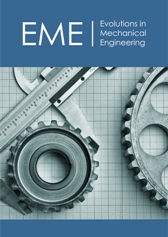- Submissions

Full Text
Evolutions in Mechanical Engineering
The Inelastic Necessity of Intermodal Freight Transportation Application
Nikolaos Bertos*
Technical University of Thessaly, Department of Mechanical Engineering, Greece
*Corresponding author: Nikolaos Bertos, Department of Mechanical Engineering, Greece
Submission: November 26, 2019;Published: December 03, 2019

ISSN 2640-9690 Volume3 Issue1
Opinion
In the recent years logistic chain’s role becomes more crucial because of the growing variance and specialism of the primary and secondary production section. The objective of every part of this chain, from producer or constructor to consumer or user of a commodity is apparently the minimization of its transportation cost. Even though it’s ostensibly null added value on the products, it constitutes significant portion of the total cost which affects the daily or strategic decisions of consumers, organisms or countries. In order to reduce this cost, it is necessary to apply modern methods in point of haulage.
Solutions such as a transportation cost optimization system and exploitation of geostrategic location of a country constitute serious issues at the agenda of the economy. The deduction margin of the transportation cost on international haulage is quite big. Only a minimum of firms manages their fleet using an optimization system for cost reduction. Countries where the average host of the trucks travelling daily highway counts some hundreds without using a central system that manipulates this huge volume, face serious problems like road/highway saturation, high accident indicator, low quality of commodity transportation, moderate customer’s satisfaction and confidence, significant environmental pollution, logistic cost increment at products etc.
Furthermore, the geographic location of a country constitutes a significant parameter in the development of such a system. The existence of airports, harbors, road and train network combined to the direct connection ability with serious centers of economic activities, even with different continents, can appoint a country as an implicitly transit center with high opportunities of development.
The main requirements of this chance are explicit infrastructure investments, generation of the appropriate co operations, a central system which manipulates the commodity’s transportation and a favorable environment for private investments. The most important is to uniformly manage transportations in order to exploit in the maximum grade the advantages of each type of carrier and to economize resources.
The European Union’s rule suggestions, regarding safety support and division of logistic chain into sections of raw material and products administration, haulage, deposit induction, storage and activities at terminals, must be coursed. Finally, transportation research and study represent a unique solution for a country without sufficient industrial production and poor exports but with a prominent geostrategic location.
Lately, an evolution in the area of logistics has been established. Computer based technologies such as intelligent highway information systems, intelligent transportation systems (I.T.S), global positioning systems (GPS) and geographic information systems (GIS) contributes to this considerable progress. Distribution, assignment, routing and transportations in general are managed in a more efficient way as a result of these technologies utility. The increasing global presence of internet of things (I.o.T) allows above procedures to be implemented remotely with significant reduction of human intervention. In addition, new programming tools (enterprise or academic) based on well known programming languages have already been developed. The fields of Mathematical Programming and Operational Research in general, have been enriched with plenty of relevant and competitive algorithms.
The absence, in the modern industry of logistics, especially in borderland areas, of a complete optimized intermodal system that will combine rail and road means of transport, constitute a serious motivation for new studies. The main intention of a potential study will be the formulation of an intermodal freight transportation system and the decrease of transportation cost in such problems. The most significant part of the integral cost belongs to the product’s delivery at the recipient, which is the last component of the operation of transportation. Big transport means (boats, trains etc) such as boats and trains can seriously reduce each product’s transportation cost. Most of the time, they cannot deliver products at their destination, though. In consequence, road network exploitation and truck’s utility become necessary. However, road transport constitutes a relatively large share of intermodal transport costs, considering potential empty vehicle movements.
© 2019 Nikolaos Bertos. This is an open access article distributed under the terms of the Creative Commons Attribution License , which permits unrestricted use, distribution, and build upon your work non-commercially.
 a Creative Commons Attribution 4.0 International License. Based on a work at www.crimsonpublishers.com.
Best viewed in
a Creative Commons Attribution 4.0 International License. Based on a work at www.crimsonpublishers.com.
Best viewed in 







.jpg)






























 Editorial Board Registrations
Editorial Board Registrations Submit your Article
Submit your Article Refer a Friend
Refer a Friend Advertise With Us
Advertise With Us
.jpg)






.jpg)














.bmp)
.jpg)
.png)
.jpg)










.jpg)






.png)

.png)



.png)






